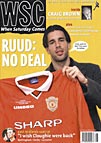 Davy Millar explains why drastic action may be needed to shake up football in Northern Ireland
Davy Millar explains why drastic action may be needed to shake up football in Northern Ireland
In what is becoming a time-honoured tradition, the Irish League season entered the final stretch with talk of reorganisation in the air. Towards the end of April, Premiership strugglers and First Division high-fliers were still unsure whether they had been putting in unnecessary effort as haggling continued over proposals to increase the size of each division.
One suggested format seeks to increase the top flight from ten to 16 clubs, a move which would annoy runaway First Division leaders Omagh, but even that isn’t enough to satisfy some. Larne, bless them, want a 20-team Premiership, a demand which speaks volumes about their current league position.
Sadly, any attempt at reorganisation promises to be as helpful as rearranging the deck chairs on the (Belfast-built) Titanic. If football really was a business, the Irish League would have packed it in years ago. Many of our sides are eking out a miserable, hand-to-mouth existence, fortified only by the goodwill, loyalty and bloody-mindedness of small groups of people who wouldn’t recognise a lost cause if it stared them in the face – which it does every Saturday.
All could still be well if only everybody acknowledged that a Northern Ireland league can only hope to exist one or two steps above pub league level. Instead, ambition keeps cropping up. Ards didn’t get where they are today (the bankruptcy court) by being a local football club, they got there by mimicking the activities of a professional outfit. They actually paid their players and managers (God knows why), only to spend Saturday aftemoons wondering if they’d forgotten to open the turnstiles.
Ards were never a successful club but even those who were, like Portadown, continue to suffer the effects of a limited fan-base. Crowds increased when the Ports began winning things but the novelty wore off, leaving the club without the funds to maintain a winning team. Linfield and Glentoran may have suffered the same drop in attendances as every other club here, but they remain the only clubs with a respectable level of support.
Even in happier times, these two were less than enamoured with life in the Irish League and made separate attempts to join its Scottish counterpart. Finding that exit blocked, they have had no option but to join their local rivals in coping with a steady decline in public interest, watching hordes of fans here spend their cash on trips to England or Scotland.
Crowds are down again this year and the absentees have no problem coming up with reasons for their disinterest. If standards can’t improve without more money coming into the game and that extra cash won’t appear without an increase in standards, where does that leave the Irish League? Well, for once, not in an uniquely desparate situation.
Although most haven’t sunk as far, there are plenty of countries in Europe where the danger signs are all too clear. In the fragmented states of the former eastern bloc, erstwhile giants compete against village teams in front of substantially reduced crowds. In the smaller westem states, domestic leagues are more unbalanced than ever as two or three teams are miles ahead of the rest. In the Champions League, all these teams are being edged out by the multiple entries from Germany, England, France, Spain and Italy.
This doesn’t mean that all these countries are destined to end up with an Irish League on their hands, though the drop might be sufficiently severe to make it seem like that – not many have a population so small that it could barely support a medium-sized European club. The trouble is that none has the population to sustain a truly competitive league which can produce sides capable of European success either.
If the gap isn’t to widen, then ideas such as the Atlantic League deserve serious consideration. In fact, if other regional leagues were established, with promotion and relegation to national leagues, then commercial power would be diffused across the continent and the European League wannabes would have less leverage over UEFA.
Coincidentally, Linfield recently revealed that they had been contacted about the possibility of joining the Atlantic League. People here, pointing out that the Blues represent the type of opposition that the instigators were trying to exclude, joked about crank callers and wrong numbers. Nothing came from that contact, leaving the Windsor Park officials slightly depressed. It’s back to the Irish League for them.
The only other offer was an all-Ireland cup featuring the top four from each part of the island, but that fell through pretty quickly too. As any fool could see, there’s no public interest in a match involving two Irish clubs. All the real action takes place elsewhere.
From WSC 160 June 2000. What was happening this month